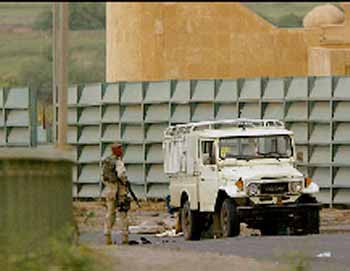While American helicopters flew over Tikrit, Marines searched pedestrians for weapons at checkpoints and vehicular traffic was strictly controlled. U.S. tanks at a bridge over the Tigris River blocked people from crossing, triggering the crowd's fury. "Americans are against freedom and democracy!" shouted one man. "Saddam shall return!" shouted another. "Victory is coming!" "(The Americans) are animals - people are sick of this. People are hungry," said a third. U.S. forces had suspected about 2,500 holdouts from the Republican Guard and the paramilitary Saddam's Fedayeen - and possibly officials from Saddam's regime - were holed up in the town 90 miles north of Baghdad. Capt. Frank Thorp, a Central Command spokesman, said U.S. forces to the south and west of Tikrit had created checkpoints to prevent regime leaders from escaping. Though initial fighting had been fierce, there was no information on casualties. American troops met less resistance than expected after the town's defenders had been subjected to airstrikes for several days. Marines attacked Tikrit from the south, west and north. On Tuesday, some people were looting Tikrit's agricultural building and the governor-general's office. But large-scale looting like that in Baghdad or Kirkuk was not immediately evident, and the Marines were disarming residents. "We're taking all automatic weapons," Marine Cpl. Courtney Davis said at a checkpoint. "With handguns and pistols, we take the rounds and give them back the guns because they need them for protection against looters." Davis, of Clarkson, Utah, said the Marines took AK-47s and rocket-propelled grenades from some vehicles. "Yesterday we got 13 AKs and detained four people," he said. Davis said he had heard from his superiors and residents that there was still some resistance in Tikrit. At the gates to Al Adl, or Justice Street, one of the Tikrit's main roads, a statue of Saddam on a horse stood proud and intact. The ousted president's photographs still blanketed the city, undefaced and unbroken. A crowd of 30 men milling around was asked if they believed Saddam was alive or dead. The consensus: "Alive." "Whatever Saddam is, he is the son of Iraq," businessman Osama Ali said. "They have come for oil!" said Mohammed Ramadan, trembling and distraught about the American presence. "Let them take the oil and leave!" Abdel Sattar Sharif Shehab al-Nasseri, 23, said he was a relative of Saddam. Asked why there was so little resistance in Tikrit, the center of Saddam's tribe and a power base of the president, he replied, "Because Tikrit is small and because ... the one who surrenders his weapon is a traitor." But at the provincial governor-general's office, looters carrying away office furniture and supplies did not share such a high opinion of the deposed president. "What we are stealing is nothing compared to what he stole," said looter Samir Mohammed.
|
